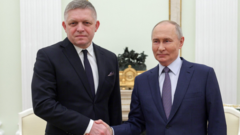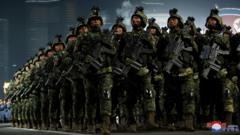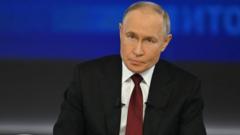As Ukraine faces relentless Russian aggression, soldiers and civilians express their hopes and fears regarding the imminent US elections. The outcomes could dramatically influence military assistance, shaping the nation’s fight for survival while opinions diverge on who would best secure Ukraine's future.
Ukraine's Soldiers Await US Election Outcome: A Battle for Support and Survival

Ukraine's Soldiers Await US Election Outcome: A Battle for Support and Survival
The ongoing conflict in Ukraine looms large as soldiers and citizens anxiously watch the upcoming US elections, which could significantly sway military aid and support.
As she cleans the broken glass at her shop in Zaporizhzhia, Inna reflects on the harsh reality of her existence, shaped by the ongoing war and the distant decisions in the United States. “We hope that Kamala Harris wins and continues to support us,” she states, surrounded by the remnants of destruction from a recent Russian bombardment that left a 10-meter crater on a nearby road. The city bears the scars of conflict daily, and with it, echoes of desperation and hope intertwine.
The frontline in Ukraine has become a battleground not just against Russian forces but also for the support of the US, which has already funneled over $50 billion in aid to assist Ukraine’s defense against the invasion that has tragically birthed a distinct shift in military goals from advancing territory to mere survival. As soldiers like Andriy recount the mounting pressure and challenges on the ground, they acknowledge that Ukraine cannot sustain its fight alone. “If aid slows down, the infantry will bear the brunt,” he warns, signaling a bleak outlook should political winds shift in Washington.
The upcoming US elections, set for November 5, loom over the conflict, as potential shifts in power could alter the flow of much-needed military support. Democratic Vice-President Harris has indicated continuity in support if she triumphs, while Donald Trump’s election could usher in uncertainty, with suggestions that Ukraine may have to concede ground to secure peace. Both scenarios trigger anxiety in Ukraine, where the stakes are painfully high; the nation might endure a ceasefire resembling the unresolved tensions seen in Korea if territorial compromises are brokered.
As anti-Russian sentiments resonate, local voices emphasize the need for tangible support from the US. In contrast, many call for an immediate end to the bloodshed, revealing a paradox in public opinion—an enduring desire to defeat Russia intertwined with a growing wish to halt the relentless violence. A woman from Pokrovsk reminisces on the early days of the invasion, expressing regret that Ukraine didn't negotiate sooner, viewing the conflict’s toll as a hefty price for sovereignty.
In contrast, figures like Lyubov, who has faced personal loss to the invading forces, maintain a fierce commitment to reclaiming lost territories. She remains uncertain about the upcoming electoral outcome but stresses the necessity of having a steadfast ally in the White House. “I want a true friend of Ukraine to support us,” she shares frankly, reflecting a sentiment echoed throughout the war-torn nation.
With hopes of foreign intervention fluctuating alongside the political climate, Ukraine finds itself straddling a delicate line between receiving pivotal support and managing the internal voices calling for peace. The geopolitical stakes could shift significantly depending on the US election results, leaving Ukraine’s future vulnerable to forces beyond its borders.
Forthcoming are the days of pivotal decision-making, as the world watches intently—not just for the sake of American politics, but for the enduring struggle and survival of the Ukrainian people. As both local sentiments and international analysis coalesce, the outcome on November 5 could redefine the course of this ongoing conflict and fundamentally alter the landscape of support for a nation fighting for its existence.






















